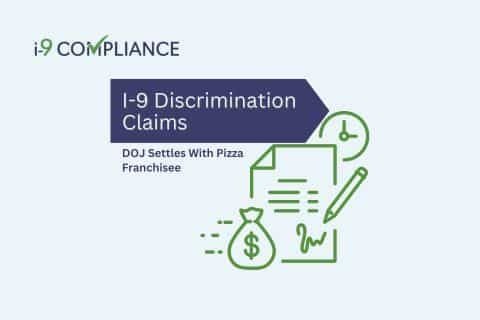DOJ Settles I-9 Discrimination Claims With Pizza Franchisee

The Department of Justice (DOJ) has announced another settlement agreement. This settlement resolves immigration discrimination claims directed at a Maryland-based pizza franchisee. According to the case, the franchisee discriminated against new hires in the employment eligibility verification (Form I-9) process. The DOJ revealed that the franchisee violated the Immigration and Nationality Act (INA) by requiring new hires to present additional documentation.
According to the Assistant Attorney General of the DOJ’s Civil Rights Division, “While employers must verify every new hire’s permission to work in the United States, they can’t require unnecessary documents or discriminate based on someone’s citizenship status or national origin.” This Assistant Attorney General followed this news with a vow: “The Civil Rights Division will continue to fight to remove discriminatory barriers to employment.”
This investigation began after a lawful permanent resident complained to the DOJ. According to the complaint, the employer requested that he present documentation beyond the required information for verifying his work authorization and identity. As a result, the DOJ made two allegations of discrimination against the employer.
First, the DOJ addressed the lawful permanent resident’s discrimination complaints about submitting unnecessary documents to verify his information. In addition, the DOJ alleged that the company illegally required the resident to present a permanent resident card to complete the E-Verify inquiry. The INA prohibits employers from requesting employees to submit their permanent resident card, also known as a green card.
Under federal law, employees may choose any legally acceptable documentation to prove their identity and work authorization. This permission applies regardless of nationality, immigration status, or U.S. citizenship. Employers cannot restrict this right to choose or request more documentation than necessary to complete Form I-9s.
According to the agreement, the DOJ will monitor the employer for two years. In addition, the employer must pay a civil penalty of $2,000. It must also ensure that all HR personnel involved in the I-9 or E-Verify process can access the Employment Eligibility Verification Handbook during the monitoring period. The DOJ also requires the HR personnel to have access to the most current U.S. Citizenship and Immigration Services (USCIS) E-Verify Manual and a copy of the most up-to-date Form I-9.
Due to the ever-changing regulations and inadequately prepared HR personnel, businesses often encounter I-9 issues such as this case. The best way to ensure I-9 compliance is by integrating an electronic I-9 management system into the onboarding process. This tool provides personnel with step-by-step guidance and features such as electronic storage and reminders of when to take action.
Learn more about automating your employment eligibility verification and ensuring compliance with I-9Compliance.